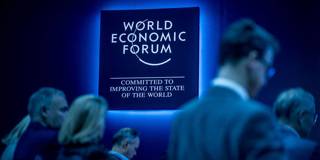Today’s global crises are not only competing for policymakers’ finite attention; they are increasingly feeding one another in unpredictable ways. Add the uncertainty around this year’s high-stakes elections in the United States and elsewhere, and you have a recipe for a Davos meeting defined by angst and paralysis.
DAVOS – This year’s World Economic Forum in Davos was even more exhausting and bewildering than usual. Politicians love to say that you should never let a crisis go to waste, but even they seemed overwhelmed by a conference agenda that aimed to capture the full sweep of today’s “polycrisis.”
The issue is not just that individual problems become more difficult to solve when there are many of them at once. It is that today’s crises are increasingly feeding one another and competing with one another for attention. Against the backdrop of rising geopolitical tensions and the escalating conflict in the Middle East, Houthi attacks on shipping in the Red Sea have become a source of unease across the global economy. Making matters worse, drought conditions in Central America – a byproduct of both cyclical weather patterns and the longer-run effects of climate change – have simultaneously curtailed shipping through the Panama Canal.
In Gaza, the humanitarian consequences of the war have worsened by the day, with the Palestinian death toll now exceeding 25,000. On panel after panel at Davos, US officials and assorted European and Arab diplomats outlined their visions for stopping the war through regional integration and a two-state solution.

DAVOS – This year’s World Economic Forum in Davos was even more exhausting and bewildering than usual. Politicians love to say that you should never let a crisis go to waste, but even they seemed overwhelmed by a conference agenda that aimed to capture the full sweep of today’s “polycrisis.”
The issue is not just that individual problems become more difficult to solve when there are many of them at once. It is that today’s crises are increasingly feeding one another and competing with one another for attention. Against the backdrop of rising geopolitical tensions and the escalating conflict in the Middle East, Houthi attacks on shipping in the Red Sea have become a source of unease across the global economy. Making matters worse, drought conditions in Central America – a byproduct of both cyclical weather patterns and the longer-run effects of climate change – have simultaneously curtailed shipping through the Panama Canal.
In Gaza, the humanitarian consequences of the war have worsened by the day, with the Palestinian death toll now exceeding 25,000. On panel after panel at Davos, US officials and assorted European and Arab diplomats outlined their visions for stopping the war through regional integration and a two-state solution.